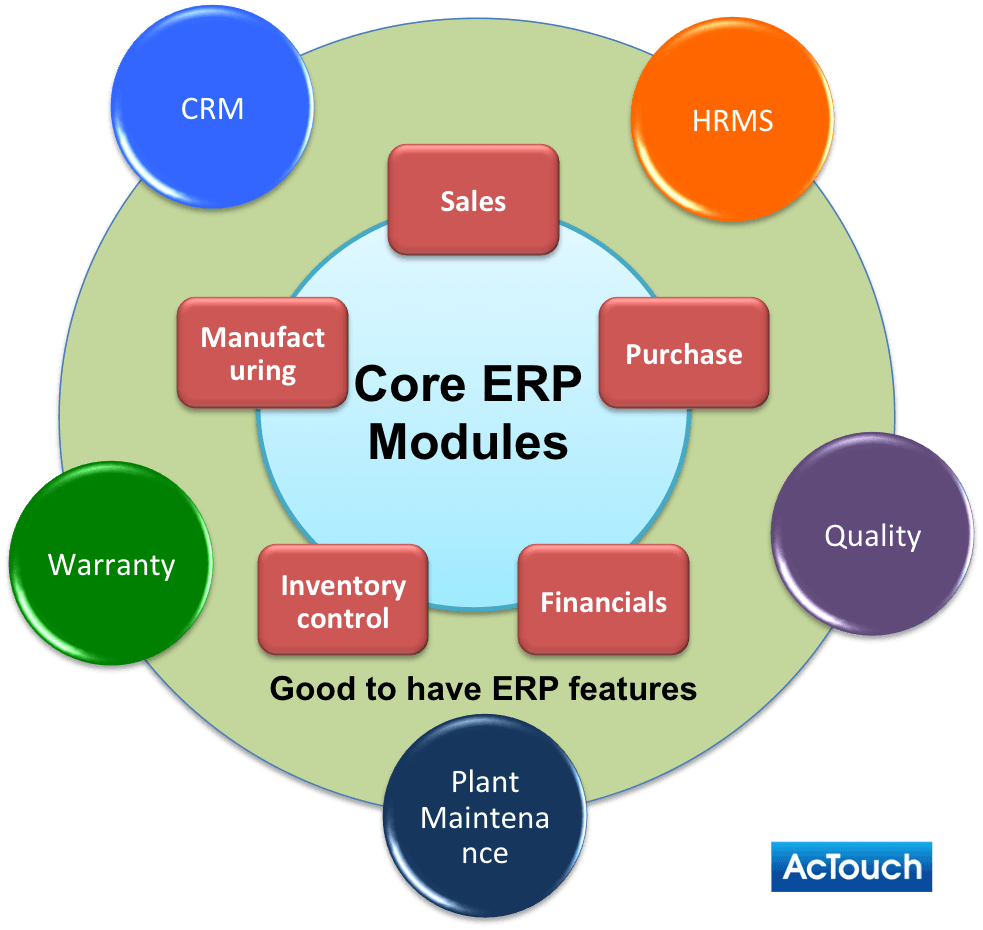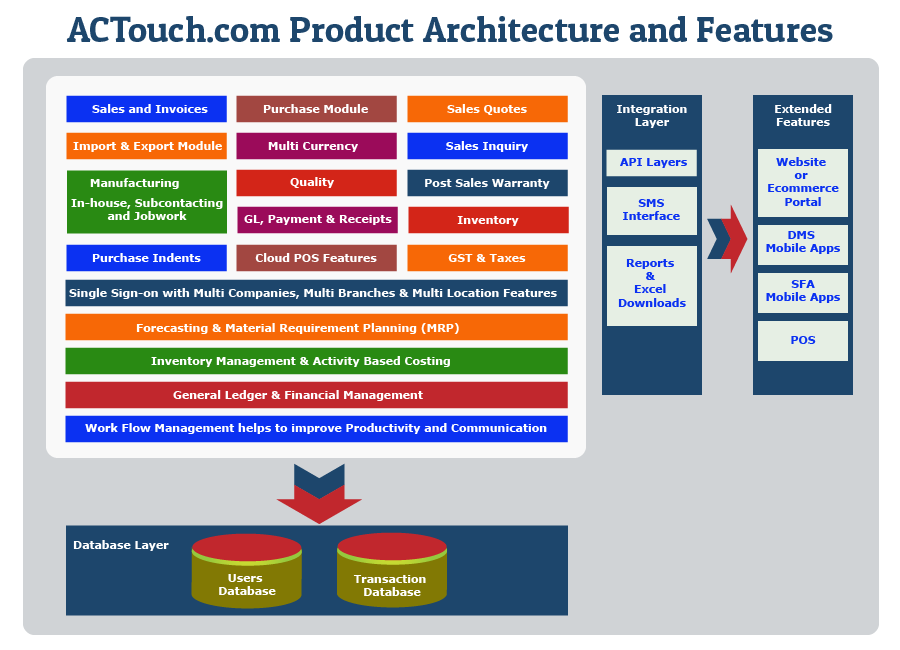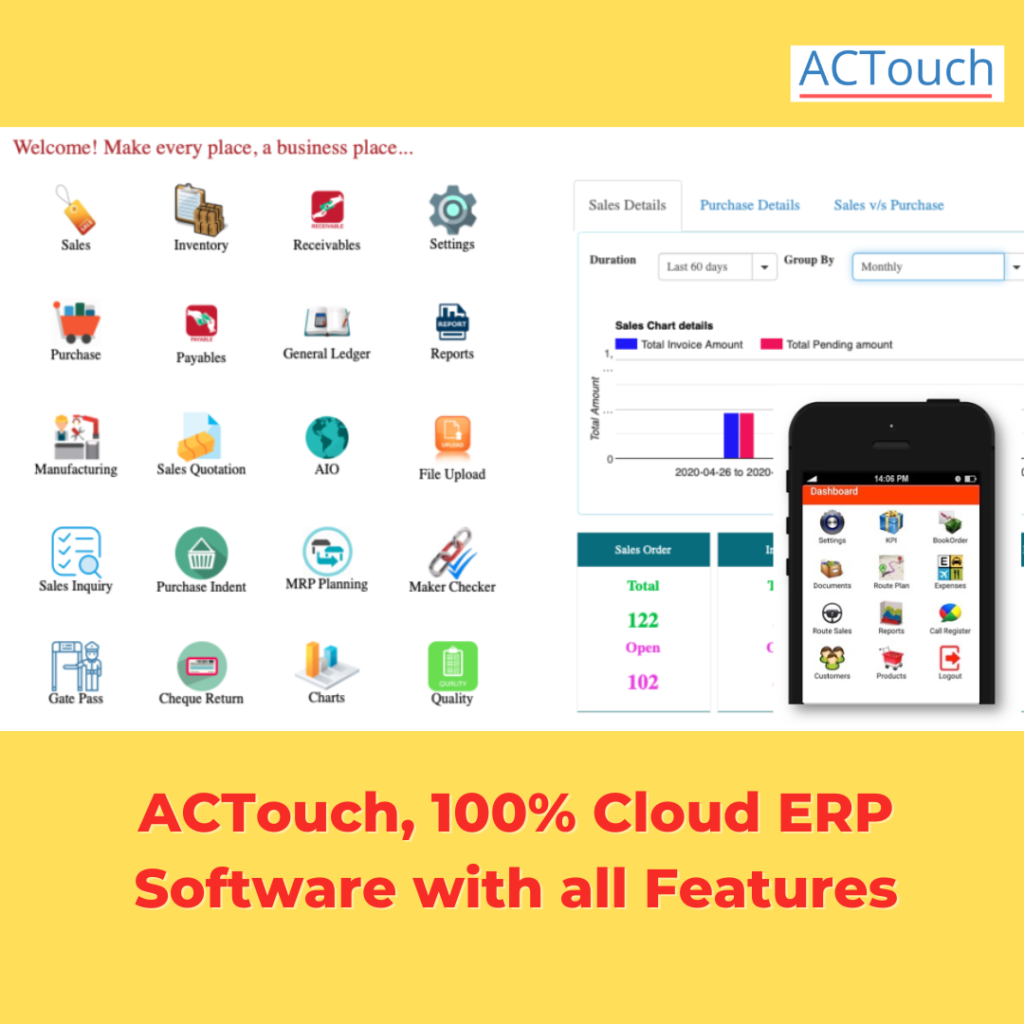ERP Modules: ERP Features and Functions
ERP Modules (Enterprise Resources Planning) and ERP Features
We discuss a list of ERP Features that are used by many best ERP Software in the world. Many ERPs like SAP B1. Ramco, TCS iON, NetSuite etc have features that’s addressed for Manufacturing, Supply Chain, Traders, Real Estate companies across the world. Here we explain many ERP Modules and ERP Features with their benefits.
In summary,
ERP Modules are grouped business features or functionalities of an ERP that does similar work or operations.
Few Highlights of this article and answer it gives are as below.
ERP Modules article will explain ERP Features and how they are used in the Business to improve productivity and controls. We explain the below questions here.
- What is ERP Features and Functions?
- What is ERP Modules and ERP Functions?
- Core ERP Modules and their benefits to Manufacturing Companies.
- What are the ERP Functions and how its integrated across ERP?
- How an ERP helps Manufacturing companies?

Figure: ERP MODULES ( ERP MODULES LIST/ ERP CORE MODULES ).
ERP Modules, in ERP System, a module is a part of a function and features, and they are composed of one or more independently developed modules that could be run independently.
For example of few ERP Modules are as below.
- Procurement module – Purchase requisition, Purchase Order, Goods Receipt, Purchase Returns etc
- Manufacturing Module, also called Manufacturing Execution System (MES)– Work Orders, BOM, Production Planning, Production Orders, Subcontracting etc.
- Supply chain Management
- Order Management – Sales, Invoices etc
- Human Resources and Payroll
- Inventory Management – Helps to manage the Stock, manage Physical inventory and stock correction etc.
- Finance Module – Payables, Receivables, General Ledger etc.
Enterprise Resource planning or shortly known as ERP is comprised of many modules (ERP Modules). ERP also contains many features and functions. As the name ERP says, it’s a consolidated Solution for the different activities of a business at one place that helps business to define workflows, control and measures.
What is ERP Modules and how these various modules of ERP help your Business?
- ERP helps to collaborate the data between multiple departments like Finance, Sales, Purchase, Manufacturing etc.
- Increases data integrity and helps to give consistency in their data presentation and approach.
- Improves employee productivity and improves business process.
- Increases the Transparency and Business complicates. These helps to increase the confidence level on the process and its outputs.
- Customer, Employees and Happy Suppliers. It increases company happiness quotients and win more business.
Before we begin to analyse the modules required as an ERP, let’s analyse the business practices that would help us to identify what modules are required.
For a Trading business, a Trader Purchases, products / items from his Vendors and Sells the same to his Customers and collect the money. Once the customer pays the money, he settles his account with Vendors. The difference between the Purchase and Sales price will be his profit or loss. This is a simple business and easy to understand.
In the above case, if a trader wants to manage his business on an ERP means, he needs these modules that helps him to manage and grow the business. We can easily identify the modules as Purchase, Vendor Management, Payments, and Sales, receive money and customer management. Along with this we need Inventory modules, product master, price details etc.
This way we could identify what are the major modules requires to run a business.
Let’s assume that we extend the same logic to a Manufacturer. He is buying Raw Material and converts it to a Finished Goods. In this process he would use Labour, Machine and other consumables. He will sell these items to his customer for a profit. Along with earlier defined modules, he also need manufacturing features like Bill of Materials, Work orders, Planning etc.
As the business needs is increased, we see the possibility of redefining and identifying the modules that are required for the business to run and grow.
To simplify we can redefine these modules as “Core Functionalities” and “Good to have”. We segregate these modules based on our experience in the Industry and ERP market. We have identified and grouped the modules based on what’s essential for the business and what’s “good to have”. Because these core functionalities can’t be missed for any business.
Benefits of Manufacturing Module in ERP for Manufacturing Companies
Create Sales Order and Sales Invoice with AcTouch Cloud ERP Solutions.
ERP Modules of a ACTouch ERP Software, Consolidated Features of ERP.
Below is the list of features list of our ACTouch cloud ERP software that can give an idea on the list of ERP modules and how they are integrated to each other.

List of Core ERP Modules – Features of ERP.
ERP Modules, ERP Functions and ERP Features.
- Sales and Invoices – Typically handles Sales Orders, Invoices and Sales Returns. These are integrated transactions and helps to manage Inventory and Customer receipts. Helps to identify which are fast moving items and what are slow moving items. Helps to analyse the Purchase to Sales cycle and see inventory turnover features.
- Purchase and Goods Receipts – To procure the materials, we need to place an Order (Purchase order) that helps vendor to send the quantities as per the PO. Once the material comes, we take it to Stores (Inventory) and pay the money as per the stock received. These Raw materials are either issued to Production or Sold to another Customer for a profit
- Inventory Control – Any movement of materials from a company to its subcontractors or sellers have to be tracked as per the statutory needs. So you need to generate Delivery Challans or Invoices etc to meet these requirements. What is essential is to update the stock details, inward and outward movements etc.
- Payments – All the payments towards Suppliers, Service providers, expenses are booked under this category
- Receipts – All Customer receipts and other incomes are booked here.
- Manufacturing – if you are manufacturer of a product then you need these modules. Manufacturing basically covers three segments in any factories.
- In-house production – Here it takes care of Bill of Materials, Finished Goods receipts, Work Orders etc.
- Subcontracting Operations – Mainly takes care of outward of Raw Materials and inward the finished goods. Post this, vendor would raise an invoice and we do the payment against the same.
- Jobwork – Mainly takes care of Inward of Raw Materials from a Customer and send the finished goods as its ready. Post this we raise an Invoice to collect the money from the Customer for the service rendered by us.
Sometime based on the kind of manufacturing process like Discrete, Process or Staged manufacturing process, you might need to map the modules to fit your needs too.
- General Ledgers – All the transactions that are originated from Inventory Transactions, Goods Receipts or Shipment / Invoicing, Financial transactions have an impact on Financials. These transactions are consolidated to generate Balance sheet, Profit and Loss sheet etc.
- Financial control and reports – All the reports like Cash-flow reports, Financial Ratios, Debtor Creditor reports etc. need to be checked regularly.
- Taxes – Purchase receipt or Invoicing, Payment and Receipt have an impact on the taxes as we have to either Pay taxes or collect and Pay taxes to govt. Many times, we can pay the net amount based on the tax collections.
“Good To have” ERP Features. These ERP Modules are optional
We identified the below modules / Features as a good to have as these may not be mandatory for 80% of business owners. This is because some of these modules are kept separate from ERP modules due to its inherent complexity (Quality modules as the process could be easy to do with Manual process rather than with ERP), Secrecy (HRMS and Payroll details), Sales Quotation etc.
Quality Module
Quality is a big subject to handle in any typical ERP application. So many vendors develop some test reports and claim that they have the module. But these many not be sufficient for the business to handle.
Because Quality Checking happens at many levels in business like during Receipt of materials, FG reporting, production stages etc. The challenge here is the each stage has different test cases and parameters to test. Some could be outer size measurement, while some could be using Plug gauges to test and report.
Warranty Modules
This is related to post sales and services module. Here we manage the post Sales Warranties given to consumer products or industrial products with number of Free Services, what items are FREE or Charged etc. This helps service engineer to track when is the next service, what items been replaced and how many items given as free etc.
HRMS or Payroll
Processing payroll, manage the leaves, manage the statutory compliance needs etc.
Sales Quotation
Sales Quotes are given to the prospects to sell the services etc.
CRM functionalities
Now a days few ERPs have come with small features of CRM that helps to manage prospects, their requirements, follow-ups etc. But CRM as such is a large module that needs to be handled differently that includes marketing activities, eMail blasts, tracking of emails, prospecting etc. So a typical ERP with CRM functionalities will fail and misguide the customers.
Plant Maintenance
Plant maintenance is an important activity in a large manufacturing companies and it requires lot of planning on when to down the machine for maintenance etc. Most of the time, these are handled with mutual understanding of Production teams and Sales demands. Recently due to ISO-9000 or Quality procedure, these activities carry a significant impact on the planning and carry an important stage.
There are many more features been developed as an extended functionality based on Industry needs and added to ERP as each Customer has his own requirements and business needs.
In ACTouch, we found that our Customers use nearly 60% of our Business functionalities while 40% of ERP Features are used very rarely. When we further analysed most of these “Good To have” category are not mandatory to run business.
So its always essential for us to decide what is required and what not. Else we confuse customers so much that they stop using ERP application.
How to choose an ERP Modules for your Business?
After understanding what an ERP Module does and how it helps you, lets understand more on what are the Modules You need for your Business?
This is very interesting case, where the ERP Modules can not be decided by your business turnover, but by the KIND / Type of Business you run.
Let’s say, you have a Discrete Manufacturing Products like Auto Components. Now whether your turnover is USD 1 Mil or USD 100 Mil, you need following BASIC ERP Modules.
- Order Management
- Procurement process
- Manufacturing Modules with Subcontracting operations.
- Inventory Management
- Finance.
In addition to the above, you can also add “HR and Payroll”, “CRM” etc.
It depends on your business goal and what business functionality that you want to digitise and select those ERP Modules and its Features.
|

